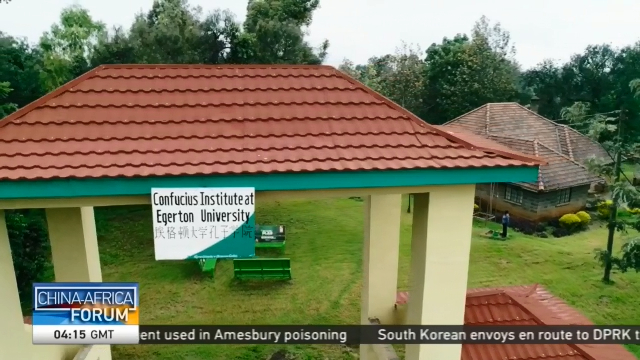
12:46, 05-Sep-2018
Building a Shared Future: Agriculture-focused Confucius Institute plants seeds of knowledge in Kenya
Updated
11:57, 08-Sep-2018
02:18

Speaking of agriculture, the Confucius Institute in Kenya's Egerton University also has something unique. CGTN's reporter He Weiwei tells us more.
This is a laboratory for Crop Molecular Biology at Kenya's Egerton University, the most advanced lab of its kind in East Africa. Jointly built by China and Kenya in 2016, it appeals to African students.
SARAH NYAMOITA EGERTON UNIVERSITY STUDENT "This lab has helped me, because of the equipment that it has. You saw the artificial intelligent climate box, it offers good temperature and humidity for the plants."
Thanks to state-of-the-art equipment, a lot of experiments can be conducted here.
ZHANG HONGSHENG DIRECTOR, CHINA-KENYA JOINT LABORATORY FOR CROP MOLECULAR BIOLOGY "We found anti-disease genes from wild tomatoes in Kenya, and we can use them to cultivate a new type of tomato resistant to common disease."
This lab doesn't belong to any biology faculty member, but to the university's Confucius Institute, which - apart from teaching Chinese - specializes in agriculture.
HE WEIWEI EGERTON UNIVERSITY, KENYA "Different from any other Confucius Institute in the world, this one has a large piece of farmland here, where Chinese teachers give practical training to local students."
The farmland is called Agro Science Park. It grows a variety of plants and crops for study, including rice, corn and wheat. Chinese professors from Nanjing Agriculture University have worked here for years.
PAUL K. KIMURTO DIRECTOR OF AGRO SCIENCE PARK, EGERTON UNIVERSITY "The Confucius Institute has given us technology. We receive Chinese professors, they come to train us, and also come to train farmers."
According to official data, agriculture is one of the key sectors of Kenya's economy, accounting for over 30% of the country's GDP. But many farmers work without proper knowledge or updated technology, so there's huge demand for agricultural professionals. Established in 2012, the Confucius Institute has over eight thousand students registered. He Weiwei, CGTN, KENYA.

SITEMAP
Copyright © 2018 CGTN. Beijing ICP prepared NO.16065310-3
Copyright © 2018 CGTN. Beijing ICP prepared NO.16065310-3